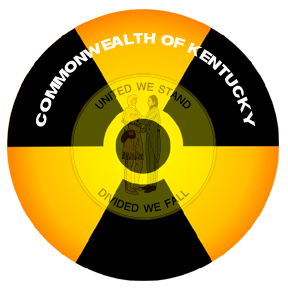By Hallmah Abdullah for McClatchy Newspapers in the Lexington Herald Leader
 Kentucky lawmakers and Department of Energy officials squared off Monday during a hearing on how to best rid a federally owned plant in Paducah of thousands of tons of depleted uranium, a toxic byproduct of the material used to help fuel nuclear weapons and reactors.
Kentucky lawmakers and Department of Energy officials squared off Monday during a hearing on how to best rid a federally owned plant in Paducah of thousands of tons of depleted uranium, a toxic byproduct of the material used to help fuel nuclear weapons and reactors.
Senate Minority Leader Mitch McConnell, Sen. Rand Paul and Rep. Ed Whitfield, R-Hopkinsville, chairman of the House Energy and Commerce Committee’s subcommittee on energy and power, have bills that would empower the agency to re-enrich some 40,000 cylinders of depleted uranium at the Paducah Gaseous Diffusion Plant, sell it and then use the money to help with environmental cleanup.
Doing so, the lawmakers say, would save the jobs of some 1,200 of the state’s nuclear plant workers. The Paducah plant is scheduled to close in 2012. The state’s congressional delegation has long pushed for cleanup at the site, which is leased and operated by USEC Inc., a former government agency that was privatized in 1998. USEC, based in Bethesda, Md., is a supplier of low-enriched uranium for commercial nuclear power plants.
Paducah is home to the only domestic facility enriching uranium.

The sprawling Gaseous Diffusion plant in Paducah, KY enriched uranium since the middle 1950s. TVA even had to build it's Shawnee Power Plant a couple of miles to the north to supply its massive electrical needs. Today, still operational, it is in need of a huge clean up at a huge price after causing hundreds of plant workers serious illnesses. Paducah officials are even trying to secure additional money to expand the plant for more jobs and ill health, ignoring the problems that already permeate their community. Photo 4/30/11 © John Blair
“Everyone knows that Kentucky is a coal state, which we are, but we are also a nuclear state,” McConnell told the subcommittee. “Paducah is a community that enthusiastically supports nuclear energy. Allowing the Paducah plant to close in 2012 and waiting years for the Department of Energy to address what to do with the existing depleted uranium, I believe, is shortsighted and irresponsible.”
McConnell pushed Energy Secretary Stephen Chu on the agency’s vague cleanup plans for the site during a Senate hearing last month.
The Department of Energy counters that selling re-enriched uranium is costly, difficult and could complicate the agency’s efforts to use the material in other ways.
The debate over what to do with depleted uranium stores goes back to the Cold War, when factories like the one at Paducah helped produce material for nuclear weapons. The toxic byproduct of these efforts has been stored for the past 60 years in tens of thousands of canisters in such places as Paducah and Piketon, Ohio.
A report by the Government Accountability Office, Congress’s investigative arm, found that the nation’s current stores of depleted uranium are worth $4.2 billion. However, that value is based on a widely fluctuating market, the GAO noted, and the Department of Energy might not be able to sell the material without additional congressional authority.
Meanwhile, the panel’s Democrats questioned what they saw as the Kentucky lawmakers’ insistence that the Department of Energy contract with USEC to enrich the depleted uranium and sell the material.
Rep. Henry Waxman of California, the committee’s ranking Democrat, pointed to the company’s history of projects that failed to launch, layoffs, a facility closure in Portsmouth, Ohio, and the selling of huge amounts of uranium — a move that rocked the uranium industry.
“I am concerned that this legislation is not currently crafted to yield the best deal for the American taxpayer,” Waxman said.
Read more: http://www.kentucky.com/2011/06/14/1774007/kentucky-lawmakers-press-for-uranium.html#ixzz1PHVb59CX
